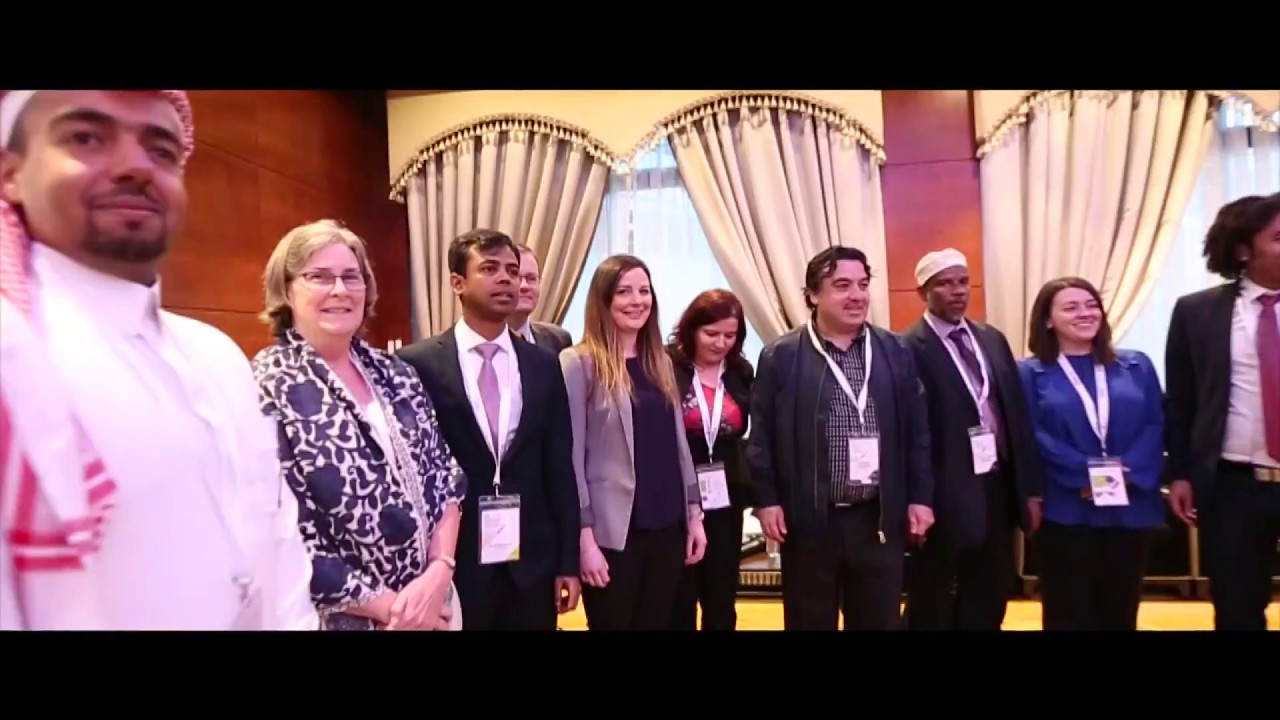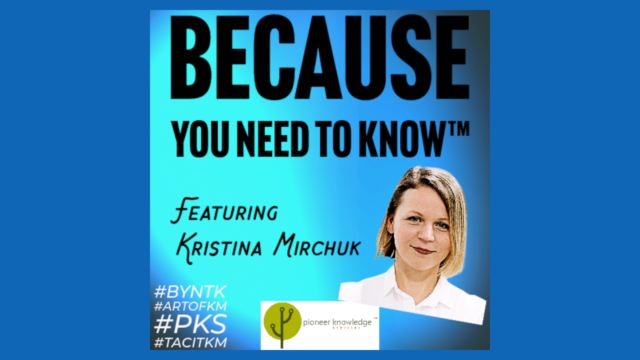
Educating Knowledge Managers series: Conclusions
Editor’s note: This final article in the serialisation of edited portions of Andre Saito’s PhD presents the overall conclusions of the Educating Knowledge Managers study.
Answers to research questions
SRQ 1: How can the field of knowledge management be described, given the present diversity of perspectives?
The analysis of current research and practice in KM reveals fundamentally distinct assumptions about knowledge and its management. Such assumptions represent what we called particular epistemological perspectives on KM. Based on an extensive review of academic and industry literature on KM, we identified and described four major perspectives on KM: information-, human-, computing– and strategy-oriented.
A questionnaire survey of KM researchers and practitioners and an analysis of master’s programs in KM provided clear evidence of three of them (information-, human- and computing-oriented). Evidence on the strategy- oriented perspective was weak in both the questionnaire survey and KM program analysis. We suggested that representatives from this perspective are relatively small in number and, though influential, have little commitment to the field.
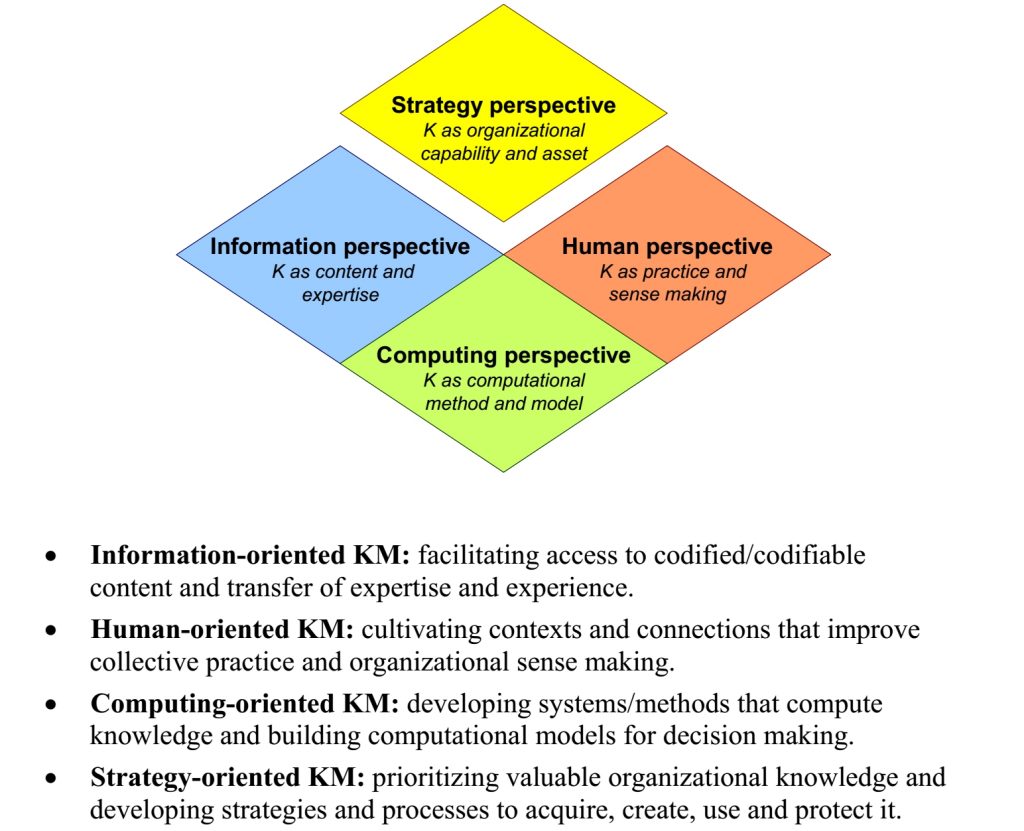
Major epistemological perspectives on KM
SRQ 2: What are the essential elements of KM competence, and how are they related to each other?
The review of the competence literature suggested two complementary aspects of the concept: a definition of scope and quality of expected performance and the identification of personal attributes that indicate individual capability. We translated that into the two core aspects of KM competence: an activity set and a capability set. The first focuses on KM-related functions and tasks that one is expected to effectively perform, while the second emphasizes the knowledge, abilities and personal characteristics that indicate the capacity for such performance. The search for typical KM activities and capabilities indicated the need for a third element: distinct perspectives on knowledge and its management that lead to very different ways to point out those most closely associated with KM.
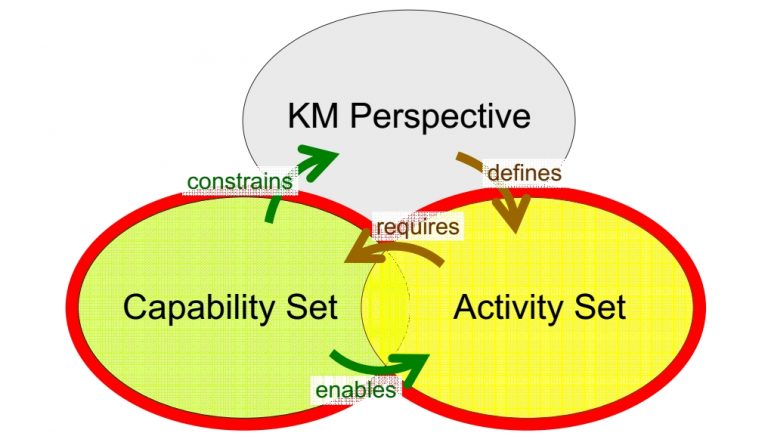
Essential elements of a model of KM competence
Those three elements, however essential, provide only an indication of what is actually meant by KM competence. The exact meaning of the concept is achieved through particular combinations of corresponding KM activities and capabilities. The description of KM capabilities is more complex than that of activities. We proposed six categories to facilitate analysis and discussion: strategic, organizational, knowledge, technological, inter-personal and personal capabilities. However, which capabilities are actually listed in those categories strongly depends on KM perspectives.
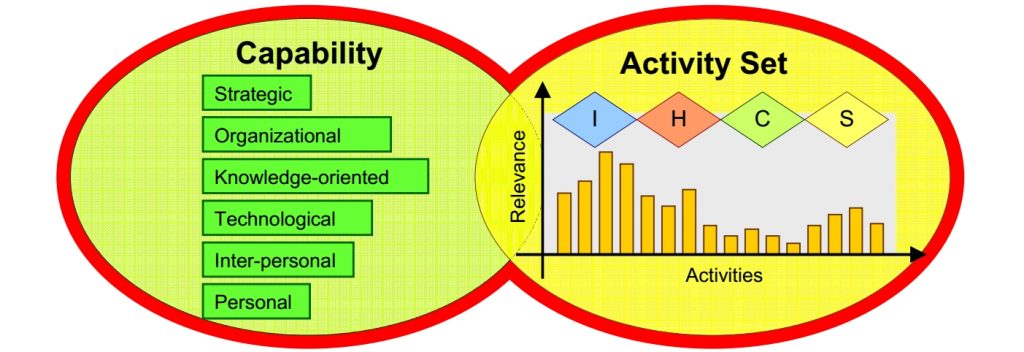
Particular combinations of corresponding KM activities and capabilities
SRQ 3: What kind of competence is being developed in graduate KM education?
In an analysis of masters programs in KM, we identified four typical sets of corresponding KM activities and capabilities reflected in their curricula. The most popular one, being developed in 10 programs, emphasizes an information-oriented perspective and was labeled the information manager profile. Two others emphasize either the human- or the computing-oriented perspectives, and were labeled the learning facilitator and the knowledge systems developer profiles, respectively. A fourth set shows a somewhat balanced perspective on KM, with a certain emphasis on the strategy orientation and some disregard for the computing, and was labeled the profile of the KM manager.
Most of those profiles emphasize a single KM perspective, which provides a limited treatment of the field to program graduates. The more balanced one, that of the KM manager, was being developed in two programs only. However, one of them was recently discontinued and the other seemed to put an excessive emphasis on content delivery, instead of competence development. There is a fundamental distinction between knowing what and knowing how, and understanding a topic is very different from being able to practice it. For instance, ‘understanding the concept of communities of practice’ and ‘being able to lead or participate effectively in them’ are different capabilities, requiring distinct kinds of conceptual knowledge, abilities and personal characteristics.
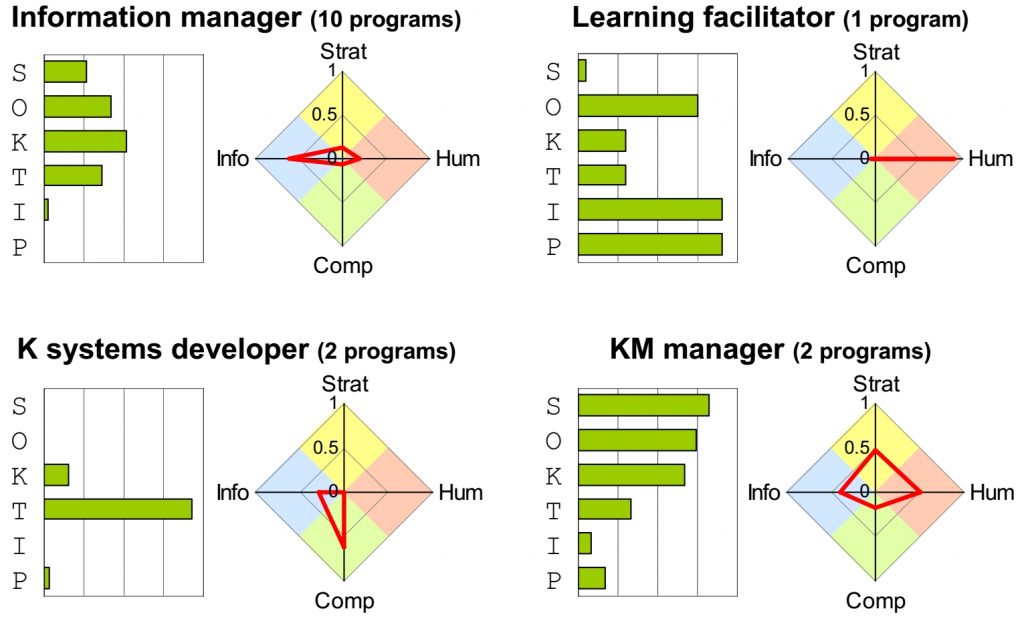
Profiles of KM competence presumed in master’s KM programs
MRQ: What is individual knowledge management competence, from an educational perspective?
After responding to each of the subsidiary research questions, we are ready to answer the major research question that has guided this study. From the empirical evidence collected in the questionnaire survey and the analysis of masters programs in KM, we conclude that there is no single way to define KM competence. Instead, there are several definitions of the concept, represented by particular combinations of KM-related activities and capabilities, each of them especially suited to specific functions, situations and contexts.
The most popular of such definitions associates KM competence with the management of information. This refers to activities like, for example, organizing and facilitating access to information; developing and maintaining information architectures and policies; and improving knowledge processes like capture, storage and distribution. Among the capabilities usually related to this definition are, for example, proficiency in information processes like access and retrieval, organization and storage, production and distribution; good understanding of user information behavior (that is, how people search for, interact and use information); and appreciation for regulatory, policy, and other social implications of use of information.
The best attempts to integrate different KM perspectives define the concept as the ability to manage KM initiatives in organizations. This includes activities like, for example, designing strategies for KM implementation; involving people and gaining support for KM; and providing measures of the value of KM. Among capabilities often cited as critical for such roles are strong leadership skills; ability to communicate effectively in a wide variety of contexts and situations; and a good understanding of business and organizational needs and how KM can support them.
These results are somewhat inconsistent with our initial motivation of developing a concept of KM competence to support the education of knowledge managers. We had defined knowledge manager as a general manager prepared for the challenges raised by the knowledge economy and society, and the KM competence profiles identified do not seem to be compatible with that.
Theoretical implications
A model of individual KM competence
The main theoretical implication of this study is a model of individual KM competence composed of three key elements: assumptions, activities and abilities. On the one hand, the model suggests that fundamental assumptions on knowledge and its management characterize perspectives on KM and define the activities typically associated with KM, therefore indicating the capabilities required for effective performance. On the other hand, it also explains that someone’s existing abilities enable the effective performance of certain KM-related activities and not others, while at the same time constraining ways of interpreting and defining the field.

The 3A model of individual KM competence
Although those elements provide a reasonable explanation of the structure of KM competence and some of its dynamics, the actual value of the model derives from particular configurations of assumptions, activities and abilities that are especially suited to specific contexts and situations. The model suggests, then, that there is no single best definition of individual KM competence, but many context-specific ways to translate the concept. Such particular configurations can be represented by typical KM competence profiles.
This model can explain two processes associated with KM competence. First, in educational settings, it explains the curriculum development process, by showing how assumptions on the nature of KM conditions the presumed set of activities that graduates should be prepared to perform, which in turn guides the design of an adequate curriculum that will seek to develop the required abilities. Second, in workplace settings, it clarifies the competence assessment process, showing how assumptions on knowledge and its management are constrained by background and current abilities, which thus limit the range of activities that can be effectively performed and how they are most likely to be enacted.
A model of interacting KM perspectives
The key issue in defining KM competence is to determine the scope of the KM activity (the activity set). Since the perspectives on KM are such a critical element in that respect, we give it a more detailed treatment here. In the empirical data, the relative prominence of each perspective was not very clear. While the questionnaire survey suggested a greater adoption of the human-oriented (roughly 50% human, 30% information, 20% computing), the KM programs showed a prevalence of the information-oriented (roughly 60% information, 20% computing, 10% human, 10% balanced). This led us to consider questions like: what is the essence of each perspective? How can they be better described? Does adoption of one perspective exclude others? Is there an overlap between perspectives? Can they be combined? Are there only four (or three), or should there be additional ones?
A closer analysis of KM program curricula and of literature reporting actual KM practice in organizations suggest a more complex picture. There is overlap between perspectives indeed: boundaries are fuzzy and they cannot be clearly separated. Any given individual cannot be properly labeled by only one KM perspective. One usually embraces a particular mix of elements from each perspective, providing a much richer and more diffuse understanding of the KM field. To better illustrate this phenomenon, we suggest that each perspective can be combined with any of the others, in varied ways and in different proportions.
Practical implications
Before discussing the practical implications of this study, we would like to recall its main motivation. We suggested that a concept of KM competence was needed to support the education of knowledge managers for the challenges brought forth by the knowledge economy and society. Knowledge manager was defined as any general manager capable of working in knowledge-intensive functions and environments, and among those challenges, three were particularly mentioned:
- growing relevance of knowledge workers and the particular characteristics of managing them
- increasingly distributed nature of knowledge and the need to integrate it to produce value
- accelerating pace of innovation and the complexity of leading in a rapidly changing environment.
Our study revealed that existing KM programs tend to emphasize a single perspective on KM, leading to limited conceptualizations of KM competence. The knowledge manager, as defined above, arguably demands a broader definition of KM competence, which suggests the need for graduate programs focusing on broader KM competence profiles.
Such KM competence profiles require programs that are strongly interdisciplinary. Several of the master’s programs in KM were developed in collaboration between two or more academic units (schools, departments). Too often, however, one of the units assumed a prominently coordinating role, and collaboration was limited to the mere exchange of existing disciplines (i.e., elective courses offered by partner units). There are, however, some examples of joint work and curriculum integration that deserve praise, among them the program at Melbourne University and the development process at California State University.
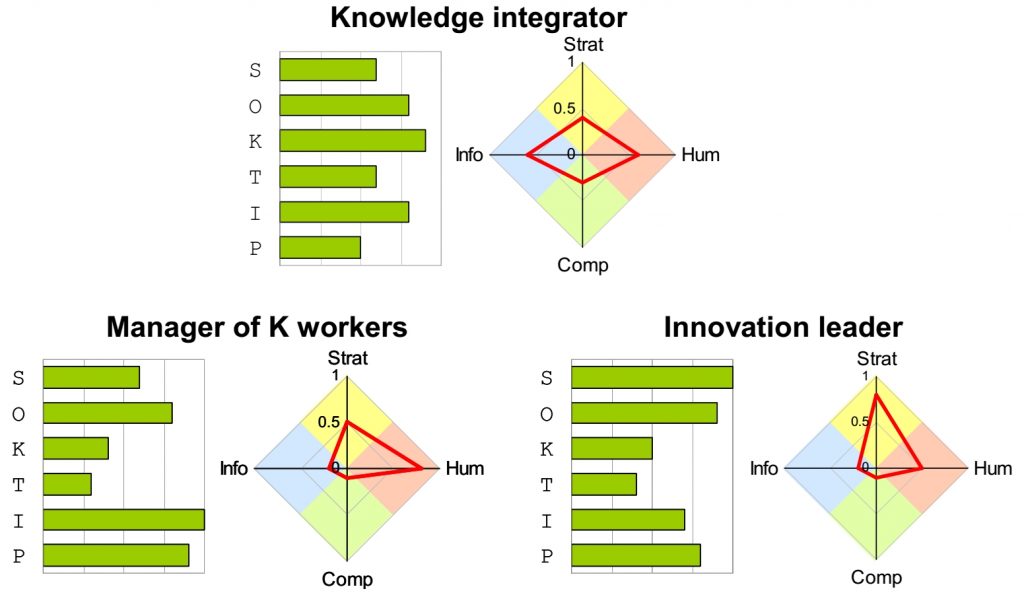
Suggested KM competence profiles for the knowledge manager
Suggestions for future research
We suspect that the KM competence profiles above may be already being partially developed in some specific graduate programs, for example management in high-tech industries and innovation management. We intend to investigate such programs in search for insights on the development of KM competence.
This study focused on KM competence from an educational or developmental perspective. Also important is the study of KM competence from an assessment or performance perspective, where the emphasis is on actual effectiveness in KM. For such a study, we intend to investigate the behavior of practitioners with KM competence profiles similar to those above.




